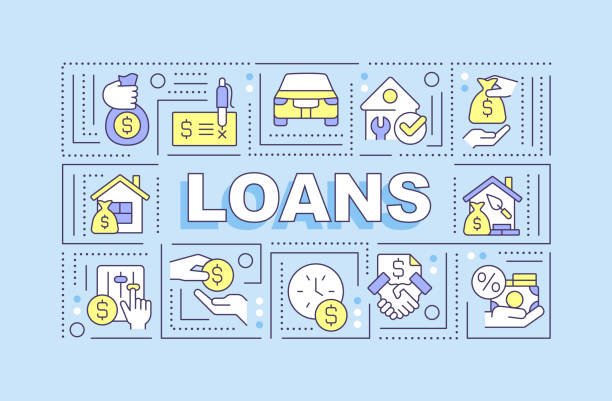Introduction
In today’s world, many people find themselves in need of loans when facing financial requirements. However, it’s crucial to choose the right type of loan based on your needs before borrowing. In this article, we will guide you through various loan options and their characteristics to help you make the best decision for your financial needs.
Types of Loans and Their Useful Applications

There are various types of loans, including personal loans, home loans, car loans, and business loans. Each type of loan has its own features and purposes. Personal loans are generally used for small financial needs and usually have lower interest rates. Home loans, as the name suggests, are for purchasing or repairing a home and tend to have longer tenures. Car loans are used for purchasing vehicles. Business loans provide funds for small or large businesses, with repayment schedules tailored to the business’s cash flow.
Understanding Your Needs and Choosing the Right Loan Type
Understanding your financial needs and selecting the appropriate loan is crucial. If you need short-term financing, personal loans or credit card debt may be better options. For purchasing a home, a home loan is recommended. For business needs, a business loan or line of credit might be more suitable. Additionally, you should consider your repayment capacity. If you do not have a stable income, avoid long-term loans.
Interest Rates and Their Impact
Before taking a loan, it’s important to understand interest rates. The interest rate is the additional amount you need to pay along with the principal. High interest rates can increase your monthly payments and the overall cost of the loan. Therefore, always look for options with the lowest interest rates and compare them. Loans may have fixed or variable interest rates. Fixed rates remain the same throughout the loan term, while variable rates can change based on market conditions.
Repayment Terms and Their Importance

Repayment terms define the duration of the loan. These terms can be short-term, medium-term, or long-term. Short-term loans have shorter repayment durations with more frequent payments. Long-term loans have longer durations with smaller payments but result in higher total interest. Choose repayment terms based on your financial situation. If you have immediate financial stability, a short-term loan may be preferable. For long-term planning, consider a long-term loan.
Eligibility Criteria and Documentation
Each loan has specific eligibility criteria, including income, credit score, employment status, and existing debt obligations. Documentation is also crucial in the loan process. You will need to provide identity proof, address proof, income proof, and financial statements. The loan process begins after verifying these documents. Ensure your documents are ready for a smooth loan process.
The Role of Credit Score
Your credit score determines your creditworthiness. A high credit score can provide lower interest rates and better loan terms, while a low credit score may result in higher interest rates and stricter terms. Improving your credit score is important if you need a loan in the future. Timely payments and managing debt can enhance your credit score. If you have a low credit score, choose loan options carefully.
Loan Processing Fees and Hidden Charges
During the loan process, there may be processing fees and hidden charges that increase the overall cost. Processing fees are upfront charges required for loan approval. Additionally, prepayment penalties and late payment fees may apply. Include these fees in your total cost calculations to understand the real cost of the loan. Opt for transparent lenders who provide clear information about their fees.
Comparing Loan Offers
Comparing loan offers will help you make a better decision. Evaluate offers from different lenders, including interest rates, terms, and charges. Online loan comparison tools and calculators can assist you in finding the best deals and offers. By comparing loan offers, you can find the best deal suited to your financial situation.
Financial Planning and Loan Management
After securing a loan, financial planning and management are crucial. Include your monthly payments in your budget and ensure timely payments. Track your expenses and avoid unnecessary spending to manage the loan effectively. Effective financial planning will make the repayment process smoother and stress-free. Balancing your income and expenses is essential for timely payments.
Debt Consolidation Options
If you have multiple loans, debt consolidation can be helpful. Debt consolidation involves combining multiple debts into a single loan. This simplifies your payments by dealing with one lender and making one monthly payment. Debt consolidation can reduce your monthly payments and simplify the repayment process. However, it requires careful analysis and planning.
Loan Forgiveness and Relief Programs
In some cases, loan forgiveness and relief programs can help alleviate financial burdens. These programs are often available through government or non-profit organizations. Research eligibility criteria and benefits of these programs. Loan forgiveness and relief programs may offer partial or complete relief, improving your financial situation.
Choosing the Right Lender
Choosing the right lender is also important. Evaluate the lender’s reputation, customer service, and loan terms. Opt for lenders who are transparent and customer-friendly. Online reviews and customer feedback can provide insights into a lender’s services and credibility. Reliable lenders who offer clear information about their loan products and services are preferable.
Legal Aspects and Terms & Conditions
Before taking a loan, it is essential to read the terms and conditions carefully. The loan agreement will detail all terms, conditions, and fees. Understand the legal aspects, such as prepayment penalties, default consequences, and loan modifications. Seek legal advice if necessary. Understanding terms and conditions helps in making an informed decision and avoiding future confusion.
Conclusion
Choosing the right loan for your financial needs is crucial for financial stability and peace of mind. By considering the points mentioned in this article, you can select the best loan option based on your requirements. Thorough research and comparison are essential to minimize financial burdens and improve financial planning. Make informed decisions with your financial goals in mind to secure your financial future.
